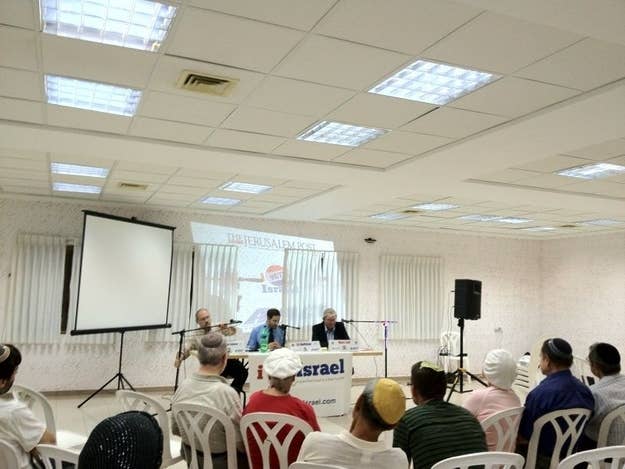
BEIT SHEMESH, Israel —On Wednesday night, dozens of American expats gathered in a bright, basement synagogue to debate the presidential election.
The question: Which candidate is best for Israel?
The event, held two days before Republican candidate Mitt Romney visits the country, was sponsored by the nonpartisan group iVoteIsrael.
And while town halls in Ohio and Michigan are filled with anxious questions about the economy, in Beit Shemesh — a city of more than 80,000, mostly Orthodox Jews, about 19 miles west of Jerusalem — the main issue was the security of their adopted country.
“The way he dealt with Egypt was an embarrassment,” shouted one woman who votes in New Jersey, drawing cheers from the audience. “Dumping our friend under the bus!”
It was the latest of campaign events for the approximately 163,000 eligible American voters living in Israel to the polls on Election Day. They are a tiny, but influential voting bloc — though some vote in uncompetitive states like New York and New Jersey, many hail from competitive districts in Florida. With Israel a hot-button issue in this election — and with Republicans trying to make inroads among Jewish voters both here and at home — they are a vocal constituency being targeted by both parties.
Some of the events, like a Romney fundraiser this coming Monday morning, are more official; others, like this one, the campaigns prefer to distance themselves from.
Sheldon Schorer, counsel and spokesman for the local chapter of the officially sanctioned Democratic Party group Democrats Abroad in Israel, faced off against Marc Zell, the co-chairman of Republicans Abroad in Israel, an affiliate of the GOP.
“For this election, where the issues are so squarely presented, I think we have to put the interests of the Jewish people above all other concerns,” said Zell.
“It is very important that politicians in America know that there are voters in Israel, said Schorer. “That makes a difference — that makes a very strong difference.”
The audience of 25 was made up of Orthodox Jewish men with yarmulkes and women covering their hair.
About 18 said they voted in the 2008 election — and all but two of them cast their ballots for John McCain and said they would support Romney this year.
The debate featured sharp attacks — Schorer said Romney is a “cowboy” on the international stage; Zell said Obama’s record is “a resounding failure” — but identified little in the way of substantive differences.
Schorer explained that Obama wants Israeli and Palestinian leaders to negotiate around the 1967 borders — instead of the 1948 lines that the Palestinians want.
“And we should be grateful for that,” said one man incredulously, saying it wasn’t a real concession asked of Palestinians.
“What has he asked the Palestinians to do other than sit down?” said another voter.
“Has anybody gone to the Palestinians and said your schoolbooks stink, you make heroes of terrorists?”
A couple originally hailing from New York came prepared with a litany of questions for Zell on Romney’s taxes, his record at Bain Capital, and why he destroyed records while Governor of Massachusetts. The Romney supporter refused to respond directly, calling the group of queries a “polemic on what we consider to be side issues in this campaign.”
After more than an hour of questioning on issues from Iran to the fate of jailed spy Jonathan Pollard (both sides agreed he’s not getting out anytime soon), moderator Gil Hoffman, the chief political correspondent for The Jerusalem Post declared: “I’ve been instructed that I have to ask about domestic issues too.”
But for Americans in Israel, even discussions of Medicare and Social security can take on a religious context.
“The social safety net of Social Security and Medicare which the Republican party is trying to tear down – reflect Jewish values,” said Schorer, later angering one audience member by using similar terms to defend abortion rights.
“What king of Jewish value is it when the cost of family health care premiums has increased,” fired back Zell.
Even topics largely ignored in the United States — like Obama’s association with Rev. Jeremiah Wright — were hot topics for debate.
Several in the audience shouted at Schorer: “How do you expect Jewish voters to support someone who sat in the pews of Jeremiah Wright for 20 years?”
Zell at first appeared ready to defend Obama on the question of whether he should be presumed guilty by association to Wright, but then proceeded to list other “troubling” Obama associates like Columbia professor Rashid Khalidi and liberal Rabbi Arnold Wolf.
“I don’t like Jeremiah Wright, I don’t like anything that he said,” replied Schorer, “but that doesn’t mean the President agreed with him on anything.”
Zell closed out the debate with an argument lasting more than 12 minutes — far beyond the allotted five — to make the case against Obama, ultimately boiling the issue down to a simple local security question.
‘There are people here in very serious positions of leadership in our country — Israel, that is,” Zell said in his closing argument, “who are terrified at the prospect of a second Obama term.”
He didn’t mention any names.
